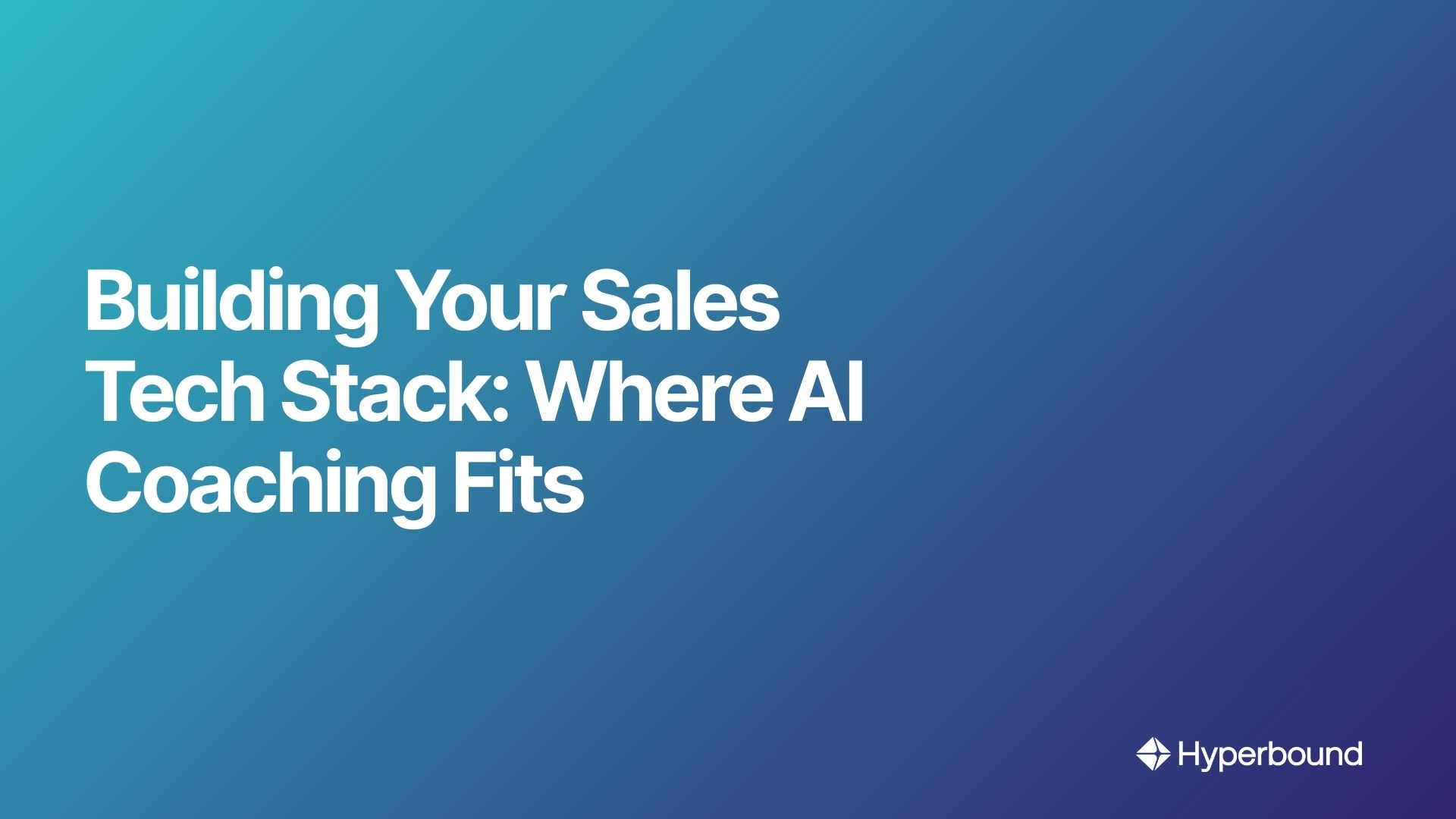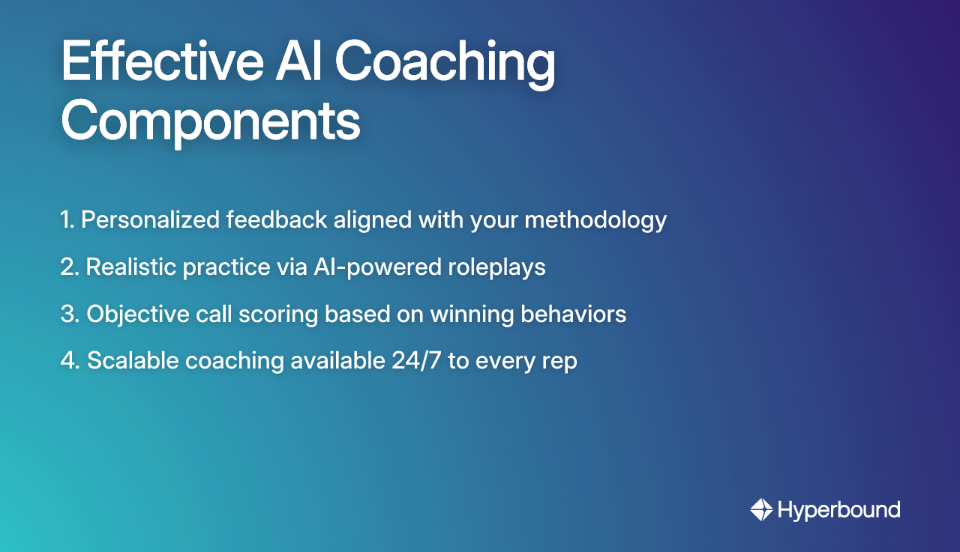
You've set up a CRM system. You've invested in a dialing platform. You've even got a sophisticated analytics dashboard. Yet somehow, half your sales team is still struggling to hit quota, and your new hires are taking months to become productive.
If this sounds familiar, you're not alone. Over half of organizations fail to unlock sufficient value from their tech investments, creating a widening performance gap between sales teams that effectively leverage technology and those that don't.
The missing piece? It might be AI coaching—but not just any AI tool hastily bolted onto your existing stack.
"We've tried new sales tools before. The team barely used them, and they just became another login to forget," a sales director recently told me. This common frustration highlights a critical truth: successful tech integration isn't about the technology itself but how strategically you implement it.
This guide will walk you through integrating AI coaching tools with your existing sales tech stack in a way that drives real business outcomes without overwhelming your team or creating workflow disruptions.
The Foundation: Your CRM and the Modern Sales Tech Stack
Your CRM serves as the central nervous system of your sales organization, but it's just one component of a healthy sales tech ecosystem. According to Boston Consulting Group, successful companies view tech implementations as business transformations, not just technology installations.
What separates high-performing sales organizations from the rest?
- Winners develop value-driven business cases, prioritize user experience, and view implementation as an opportunity to optimize processes.
- Laggards focus excessively on technology features, neglect user workflows, and lack adequate change management, leading to resistance and abandonment.
The result? A tech stack that costs more than it returns—plagued by costly maintenance, lack of automation, and poor data management.

Identifying the "Coaching Gap" in Your Tech Stack
While CRMs excel at storing customer information and tracking deals, they fall short in one critical area: developing your salespeople's skills. This is the "coaching gap" that AI is uniquely positioned to fill.
Traditional sales coaching faces three significant limitations:
- Scalability: Managers simply don't have enough time to provide consistent coaching to every rep.
- Consistency: The quality of coaching varies widely based on manager skill and bandwidth.
- Objectivity: Human coaches naturally bring biases to their evaluations.
This is why the AI software market for sales is booming—valued at $122 billion in 2024 and projected to reach $467 billion by 2030. But what exactly should you look for in an AI coaching solution?

A truly effective AI coach doesn't just provide generic advice. It offers:
- Personalized feedback aligned with your specific sales methodology
- Realistic practice opportunities through AI-powered roleplays
- Objective call scoring based on your team's proven winning behaviors
- Scalable coaching that's available 24/7 to every rep
When evaluating AI coaching tools, prioritize those that analyze your team's actual sales conversations to provide contextually relevant guidance—not generic, one-size-fits-all advice.
A Strategic Blueprint for Integrating AI Coaching
Adding AI coaching to your tech stack requires thoughtful planning to ensure adoption and ROI. Here's a three-phase approach that minimizes disruption while maximizing value:
Phase 1: Audit and Goal Setting
Before selecting any tool, clearly identify your specific sales challenges:
- Are your new hires taking too long to ramp up?
- Do you see inconsistent performance across your team?
- Are reps struggling with particular stages of the sales process (discovery, objection handling, negotiation)?
- Is your manager-to-rep ratio making consistent coaching impossible?
Then, establish concrete sales goals tied to these pain points: "Reduce new hire ramp time by 30%" or "Increase discovery call-to-demo conversion rate by 15%." These specific targets will guide your implementation and help measure success.
Phase 2: Choosing the Right Tool with Integration in Mind
The most powerful AI coaching tool becomes useless if it creates data silos or adds friction to your sales process. When evaluating options, prioritize:
- Seamless CRM integration: The tool should automatically sync with your existing CRM to maintain a single source of truth.
- Call recording compatibility: Look for solutions that work with your current call recording system (or provide their own with a simple call ID process).
- User-friendly interface: If it takes more than 15 minutes to teach a rep how to use it, adoption will suffer.
- Customization capabilities: The AI should adapt to your specific sales methodology, not force you to change your proven approach.
- Technical setup requirements: Evaluate what's needed for implementation—will it require IT resources or can it be managed by sales operations?
Hyperbound, for example, integrates with existing CRMs and call recorders while offering flexible implementation options. Its AI analyzes your team's actual winning behaviors from real sales calls to create hyper-realistic roleplays with simulated customers and provide objective call scoring.
Phase 3: The Human Element (Change Management)
This is where most tech implementations fail. Follow these steps to ensure adoption:
- Start with education: Use simple language to explain the benefits. Frame the AI as a personal sales trainer, not a surveillance tool.
- Begin with a pilot group: Select tech-savvy reps who can become internal champions.
- Implement in phases: Don't overwhelm your team with all features at once.
- Week 1-2: Introduce AI call scoring on recorded calls
- Week 3-4: Add role-play capabilities for specific scenarios
- Week 5-6: Implement real-time coaching features
- Create feedback loops: Schedule regular check-ins to address concerns and highlight wins.
- Gamify the experience: Use leaderboards and recognition to drive engagement.
One sales manager who successfully implemented an AI coaching tool shared: "We started with just three reps using the role-play feature to practice objection handling. When the rest of the team saw how much more confident these reps became in calls, they were begging to get access."

Navigating the Practical Hurdles: Addressing Real Concerns
Based on conversations with sales leaders implementing AI coaching, here are the most common concerns and how to address them:

"Are there hidden usage-based fees?"
Solution: During vendor evaluation, request a comprehensive breakdown of all costs, including any usage-based fees. Modern platforms like Hyperbound typically have transparent pricing that includes all necessary infrastructure costs. Perform a thorough cost-benefit analysis comparing the investment against expected performance gains.
"Is this compliant with Do Not Call laws?"
Solution: Prioritize platforms with enterprise-grade security and compliance features. Look for certifications like SOC 2 Type II compliance. Ask vendors specifically about their compliance with telecommunications regulations, especially if your team works across multiple states or countries. Ensure the platform provides local number capabilities that respect regional compliance requirements.
"Is the AI actually smart enough to provide good coaching?"
Solution: The most effective AI coaching platforms don't use generic models. They analyze your company's top performers and winning calls to build coaching models specific to your products, methodology, and buyers. During evaluation, request demos with your actual sales scenarios and prompt packs customized to your business.
A sales enablement leader who initially doubted AI coaching shared: "I was skeptical about AI's ability to understand our complex sales process. But after seeing it analyze our top performers' calls and create customized roleplays based on our specific objection handling techniques, I was convinced."
"Will my team feel micromanaged and resist using this?"
Solution: Focus on the empowerment aspects of the tool. Highlight features like:
- On-demand practice opportunities with simulated customers
- Self-paced skill development
- Ability to prepare for high-stakes calls in a risk-free environment
- Gamified elements that make learning enjoyable
Frame the implementation as investing in their growth rather than monitoring their performance.
From Tech Stack to Performance Engine
A well-integrated AI coaching tool transforms your sales tech stack from a system of record into a system of improvement. By analyzing what your top performers do differently and making those insights accessible to everyone, AI coaching democratizes excellence across your entire team.
The key to success isn't the technology itself but your strategic, human-centric approach to its integration. By focusing on value, prioritizing user workflow, and managing the change process effectively, sales managers can unlock significant performance gains.
Imagine a scenario where:
- Your new hires reach quota 30% faster
- Your middle performers adopt the techniques of your top reps
- Your managers spend less time reviewing calls and more time on high-value strategic coaching
- Your entire team consistently hits their sales goals
This isn't just a technology vision—it's the reality for organizations that thoughtfully integrate AI coaching into their sales tech stack. The gap between high and low-performing sales teams will continue to widen, with the strategic adoption of AI coaching being a defining factor in which side of that gap your team lands.
As you evaluate your options, remember: the goal isn't to add another tool to your tech stack—it's to create an integrated performance engine that empowers every member of your sales team to excel.

Frequently Asked Questions
What is AI sales coaching?
AI sales coaching is a technology that uses artificial intelligence to analyze sales conversations, provide personalized feedback, and offer scalable practice opportunities to help sales representatives improve their skills. Unlike traditional coaching, which is limited by manager availability, AI coaching tools can provide consistent, objective feedback 24/7, often including features like AI-powered roleplays and objective call scoring based on proven winning behaviors.
Why should I integrate AI coaching with my CRM?
Integrating AI coaching with your CRM creates a single source of truth by connecting performance data (from coaching) with outcome data (from the CRM). This allows you to see a direct correlation between skill development and sales results, such as conversion rates and deal sizes. It also streamlines workflows, preventing data silos and ensuring the coaching tool works within the sales team's existing environment.
How does AI coaching improve sales team performance?
AI coaching improves sales team performance by democratizing the skills of your top performers, reducing new hire ramp time, and providing consistent skill development for every rep. It analyzes the winning behaviors from your best reps' calls to create targeted training. This allows new hires to practice and gain confidence faster, while middle performers receive the objective feedback needed to adopt the habits of top reps.
What are the biggest challenges when implementing AI coaching?
The biggest challenges when implementing AI coaching are ensuring user adoption, integrating the tool seamlessly with existing workflows, managing change effectively, and proving ROI. Resistance from the sales team is a common hurdle, which can be overcome by framing the tool as a personal development resource. A strategic implementation plan that includes a pilot program, phased rollout, and clear communication is crucial to address these challenges.
How can I ensure my sales team adopts a new AI coaching tool?
To ensure adoption, you must focus on the human element by clearly communicating the benefits to the reps, starting with a small pilot group of champions, and gamifying the experience. Frame the AI tool as a personal sales trainer designed to help them close more deals. Introduce features in phases to avoid overwhelming the team, and use leaderboards and recognition to make the learning process engaging.
Will AI replace my sales managers?
No, AI coaching is designed to augment, not replace, sales managers. It handles the repetitive, time-consuming aspects of coaching, such as listening to call recordings, freeing up managers for higher-value strategic activities. The AI provides the data-driven insights, and the manager provides the human wisdom, context, and motivation needed for strategic deal coaching and personalized career development.
Looking to explore how AI coaching could fit into your existing sales tech stack? Hyperbound offers personalized demos that use your actual sales scenarios to showcase how AI coaching can address your specific challenges.
Book a demo with Hyperbound
.png)













